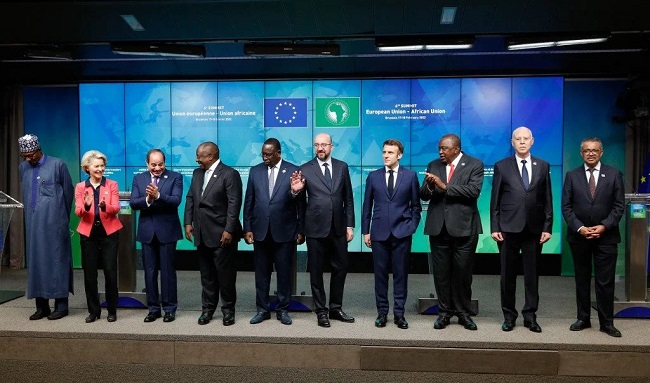Following the EU-AU summit last week, climate activists have cautiously welcomed the announcement of the over € 150 billion EU-AU Global Gateway investment package, part of which is intended to support a just transition to green energy and climate resilience in Africa.

They have expressed a need for clarity on the details of how the fund will be disbursed, the terms and timelines for the implementation of these plans.
The funds come at a time when African nations are experiencing more severe and frequent climate impacts, despite contributing the least to the climate crisis.
Meanwhile, developed nations are yet to honour climate finance pledges of $100 billion a year to developing nations, aimed at supporting adaptation to and mitigation against climate change.
In a reaction, Landry Ninteretse of 350Africa.org said: “We welcome the move to support a just energy transition in Africa, away from fossil fuels towards sustainable, clean, energy solutions that also cater to the needs of fossil dependent workers. Africa has very urgent climate challenges and priorities.
“The type of climate action the continent needs should support human-centered development and economic diversification and transformation based on sustainable green solutions. It is crucial that clarity is offered on how much will be dedicated to this energy transition as well as concrete terms, plans and timelines for the funding,
“in order to ensure that the goal is indeed achieved. Additionally, as the EU pledges to support a green energy transition in Africa, some EU governments, such as France continue the development of fossil fuels infrastructure such as the East Africa Crude Oil Pipeline (EACOP). This hypocrisy and contradictions have to stop.”
Daouda Gueye of RAPEN, a network of organisations fighting against coal and gas in Bargny, Senegal, said: “Plans for a green energy transition in Africa should not include development of new gas infrastructure, as some African countries intend to do. Plans by some African nations to replace coal projects with gas plants, such as the Bargny coal plant in Senegal, are ill-advised and will only serve to lock Africans into fossil fuel dependence.
“The effects of fossil fuels, which have heightened global heating are being experienced across the continent in the form of devastating climate impacts. We will continue to put up a joint, spirited fight, to hold our governments to account on issues of coal and gas. African governments have to take action to move away from all polluting fossil fuels, gas included, and instead invest heavily in clean energy for the sake of the environment and local communities.”
Apart from an energy transition and climate resilience in Africa, the over €150 billion Global Gateway Investment package is also meant to fund the Great Green wall initiative aimed at supporting greening of the Sahel, improving climate resilience in the area, in order to restore dignified and sustainable living conditions. Other areas of support featured in the investment package include education, digital transition, health and infrastructure.
The EU-AU, which took place in Brussels, Belgium, saw the EU and AU commit to a joint vision for a “renewed partnership” aimed at addressing immediate opportunities and challenges for both regions.
